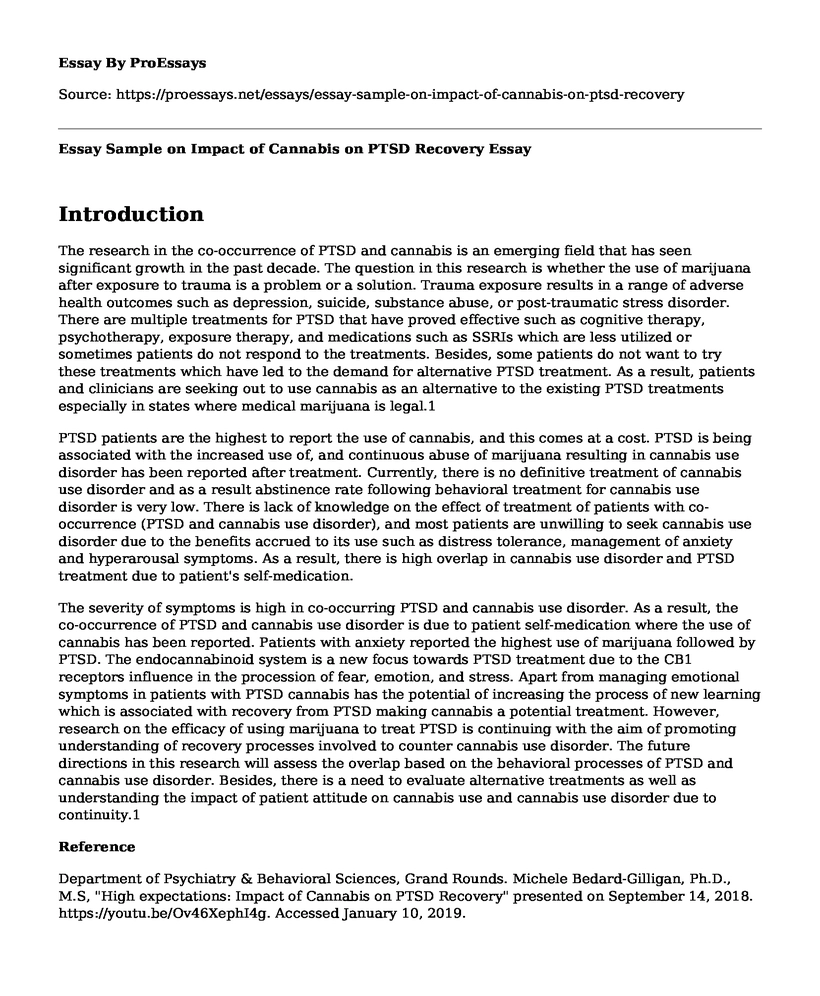Introduction
The research in the co-occurrence of PTSD and cannabis is an emerging field that has seen significant growth in the past decade. The question in this research is whether the use of marijuana after exposure to trauma is a problem or a solution. Trauma exposure results in a range of adverse health outcomes such as depression, suicide, substance abuse, or post-traumatic stress disorder. There are multiple treatments for PTSD that have proved effective such as cognitive therapy, psychotherapy, exposure therapy, and medications such as SSRIs which are less utilized or sometimes patients do not respond to the treatments. Besides, some patients do not want to try these treatments which have led to the demand for alternative PTSD treatment. As a result, patients and clinicians are seeking out to use cannabis as an alternative to the existing PTSD treatments especially in states where medical marijuana is legal.1
PTSD patients are the highest to report the use of cannabis, and this comes at a cost. PTSD is being associated with the increased use of, and continuous abuse of marijuana resulting in cannabis use disorder has been reported after treatment. Currently, there is no definitive treatment of cannabis use disorder and as a result abstinence rate following behavioral treatment for cannabis use disorder is very low. There is lack of knowledge on the effect of treatment of patients with co-occurrence (PTSD and cannabis use disorder), and most patients are unwilling to seek cannabis use disorder due to the benefits accrued to its use such as distress tolerance, management of anxiety and hyperarousal symptoms. As a result, there is high overlap in cannabis use disorder and PTSD treatment due to patient's self-medication.
The severity of symptoms is high in co-occurring PTSD and cannabis use disorder. As a result, the co-occurrence of PTSD and cannabis use disorder is due to patient self-medication where the use of cannabis has been reported. Patients with anxiety reported the highest use of marijuana followed by PTSD. The endocannabinoid system is a new focus towards PTSD treatment due to the CB1 receptors influence in the procession of fear, emotion, and stress. Apart from managing emotional symptoms in patients with PTSD cannabis has the potential of increasing the process of new learning which is associated with recovery from PTSD making cannabis a potential treatment. However, research on the efficacy of using marijuana to treat PTSD is continuing with the aim of promoting understanding of recovery processes involved to counter cannabis use disorder. The future directions in this research will assess the overlap based on the behavioral processes of PTSD and cannabis use disorder. Besides, there is a need to evaluate alternative treatments as well as understanding the impact of patient attitude on cannabis use and cannabis use disorder due to continuity.1
Reference
Department of Psychiatry & Behavioral Sciences, Grand Rounds. Michele Bedard-Gilligan, Ph.D., M.S, "High expectations: Impact of Cannabis on PTSD Recovery" presented on September 14, 2018. https://youtu.be/Ov46XephI4g. Accessed January 10, 2019.
Cite this page
Essay Sample on Impact of Cannabis on PTSD Recovery. (2022, Nov 19). Retrieved from https://proessays.net/essays/essay-sample-on-impact-of-cannabis-on-ptsd-recovery
If you are the original author of this essay and no longer wish to have it published on the ProEssays website, please click below to request its removal:
- Hume Moral Judgments and Self-Love Theories Essay
- How Aging, Ethnicity, Life Situations, and Disease Affect Person and Health as an Aging Adult
- Radon: A Silent Killer With Life-Threatening Effects - Essay Sample
- Essay Sample on Early Intervention Needed for Kids with Autism, Mental Illness
- Research Paper on Sport Medicine Career Path: An Exploration of Education, Training and Job Opportunities
- COVID-19: US Economy in a Free Fall Amid Lockdown and Quarantine - Essay Sample
- Cavalier Hospital's Strategic Decision - Essay Sample







